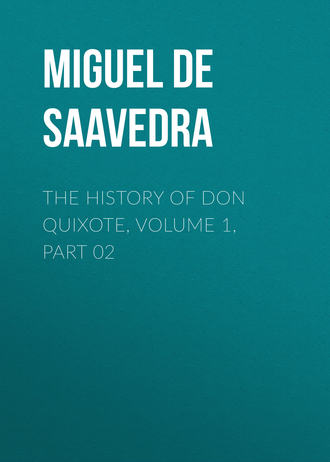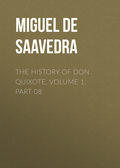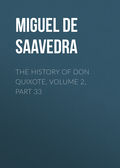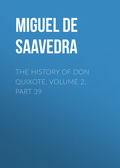
Мигель де Сервантес Сааведра
The History of Don Quixote, Volume 1, Part 02
"He will do nothing of the kind," said Don Quixote; "I have only to command, and he will obey me; and as he has sworn to me by the order of knighthood which he has received, I leave him free, and I guarantee the payment."
"Consider what you are saying, senor," said the youth; "this master of mine is not a knight, nor has he received any order of knighthood; for he is Juan Haldudo the Rich, of Quintanar."
"That matters little," replied Don Quixote; "there may be Haldudos knights; moreover, everyone is the son of his works."
"That is true," said Andres; "but this master of mine – of what works is he the son, when he refuses me the wages of my sweat and labour?"
"I do not refuse, brother Andres," said the farmer, "be good enough to come along with me, and I swear by all the orders of knighthood there are in the world to pay you as I have agreed, real by real, and perfumed."
"For the perfumery I excuse you," said Don Quixote; "give it to him in reals, and I shall be satisfied; and see that you do as you have sworn; if not, by the same oath I swear to come back and hunt you out and punish you; and I shall find you though you should lie closer than a lizard. And if you desire to know who it is lays this command upon you, that you be more firmly bound to obey it, know that I am the valorous Don Quixote of La Mancha, the undoer of wrongs and injustices; and so, God be with you, and keep in mind what you have promised and sworn under those penalties that have been already declared to you."
So saying, he gave Rocinante the spur and was soon out of reach. The farmer followed him with his eyes, and when he saw that he had cleared the wood and was no longer in sight, he turned to his boy Andres, and said, "Come here, my son, I want to pay you what I owe you, as that undoer of wrongs has commanded me."
"My oath on it," said Andres, "your worship will be well advised to obey the command of that good knight – may he live a thousand years – for, as he is a valiant and just judge, by Roque, if you do not pay me, he will come back and do as he said."
"My oath on it, too," said the farmer; "but as I have a strong affection for you, I want to add to the debt in order to add to the payment;" and seizing him by the arm, he tied him up again, and gave him such a flogging that he left him for dead.
"Now, Master Andres," said the farmer, "call on the undoer of wrongs; you will find he won't undo that, though I am not sure that I have quite done with you, for I have a good mind to flay you alive." But at last he untied him, and gave him leave to go look for his judge in order to put the sentence pronounced into execution.
Andres went off rather down in the mouth, swearing he would go to look for the valiant Don Quixote of La Mancha and tell him exactly what had happened, and that all would have to be repaid him sevenfold; but for all that, he went off weeping, while his master stood laughing.
Thus did the valiant Don Quixote right that wrong, and, thoroughly satisfied with what had taken place, as he considered he had made a very happy and noble beginning with his knighthood, he took the road towards his village in perfect self-content, saying in a low voice, "Well mayest thou this day call thyself fortunate above all on earth, O Dulcinea del Toboso, fairest of the fair! since it has fallen to thy lot to hold subject and submissive to thy full will and pleasure a knight so renowned as is and will be Don Quixote of La Mancha, who, as all the world knows, yesterday received the order of knighthood, and hath to-day righted the greatest wrong and grievance that ever injustice conceived and cruelty perpetrated: who hath to-day plucked the rod from the hand of yonder ruthless oppressor so wantonly lashing that tender child."
He now came to a road branching in four directions, and immediately he was reminded of those cross-roads where knights-errant used to stop to consider which road they should take. In imitation of them he halted for a while, and after having deeply considered it, he gave Rocinante his head, submitting his own will to that of his hack, who followed out his first intention, which was to make straight for his own stable. After he had gone about two miles Don Quixote perceived a large party of people, who, as afterwards appeared, were some Toledo traders, on their way to buy silk at Murcia. There were six of them coming along under their sunshades, with four servants mounted, and three muleteers on foot. Scarcely had Don Quixote descried them when the fancy possessed him that this must be some new adventure; and to help him to imitate as far as he could those passages he had read of in his books, here seemed to come one made on purpose, which he resolved to attempt. So with a lofty bearing and determination he fixed himself firmly in his stirrups, got his lance ready, brought his buckler before his breast, and planting himself in the middle of the road, stood waiting the approach of these knights-errant, for such he now considered and held them to be; and when they had come near enough to see and hear, he exclaimed with a haughty gesture, "All the world stand, unless all the world confess that in all the world there is no maiden fairer than the Empress of La Mancha, the peerless Dulcinea del Toboso."






